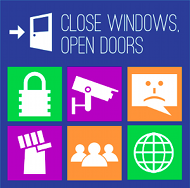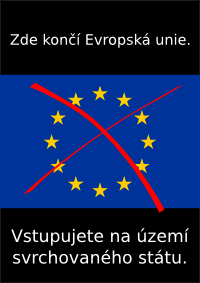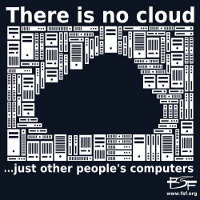Moje odkazy
Future of the Free Software Foundation
vydáno: 22. 9. 2019 16:28, aktualizováno: 13. 8. 2020 10:21
I am a FSF associate member, since 2009-12-19. I do not agree with recent attacks on RMS which led to his resignation. Regardless of his future position in the FSF, this is my vision how we should continue.
What to do:
- Stick to the pure ideas of free software – four essential freedoms – which guarantee that anyone can use the software for any purpose (and not only use, but also study, modify or redistribute). We went a long and successful way since 1984. The goals that looked like insane fantasies in the early days are real now. We have free operating systems running on our workstations and desktops, on our mobile devices, on our servers, from the most powerful ones (every single supercomputer from the Top 500 runs a free operating system) through ordinary servers to even the smallest ones or other devices like modems or gateways. Free software is embedded almost everywhere now. We have plenty of free useful application software and tools. And even the hardware is getting more and more open, we have architectures like RISC-V or OpenPOWER which are available and coming to be widespread. We must continue this way and tirelessly replace remaining pieces of non-free proprietary technologies.
- Support and promote copyleft licenses GNU GPLv3 and GNU Affero GPLv3, because these licenses guarantee software freedoms for every single end-user and prevent possibility that freedom vanishes somewhere in the distribution chain and the user can not benefit from the free software albeit the software is build on originally free source code.
- Support and promote free hardware. Running free software on a proprietary hardware is only a halfway success. There are irreparable bugs and even intentional backdoors in the proprietary hardware which undermine our efforts, our freedom and our privacy. We have a great programme – Respects Your Freedom (RYF) certifications. But this is just the beginning, there is still lot of work to be done. One of the topics might be e.g. the free toolchain for FPGA.
- Support and promote decentralized social networks and developer infrastructure. Most of the users are now trapped in centralized proprietary social networks and other online services – partly due to the network effect and partly due to their own ignorance, because they signed a contract (agreed with Terms and conditions) that they have not understood or even read. We must warn the public about how bad the situation is and show the way how to get out of it. We must set the standards and promote free alternatives which are distributed, P2P and owned and controlled by the users. It is unjustifiable if a free software developer is forced to sign a contract with a third-party corporation in order to report a bug or offer a patch to an independent project. Free software projects deserve infrastructure owned and controlled by them and the users and contributors – not by any third-party.
- Help corporate and independent software developers to get better work conditions. Among the developers, it is quite common to work for a big corporation. Everyone needs to pay bills and there is nothing wrong with selling your time and getting the money. But the contracts created by evil corporate lawyers are often written in particular way which allows seizing anything created by the developer even in the time not paid by the corporation and on the computers not owned by the corporation. In some cases they can waywardly seize anything created by the developer even a year or more after the end of the contract. These contracts endanger the free software and contributions of such developers. We must draw attention to this issues and show the right way. We should provide templates of fair contracts for both employees and for independent contractors developing software.
- Stay independent, sovereign and strong. The FSF leaders should be responsible solely to the FSF members – not to any external entity (assuming that they do not violate the law, of course). Only the members could withdraw the leaders. And if somebody else want to do it, he would have to persuade the members.
- The core ideas like four freedoms or copyleft are rigid and kind of constitutional – must be kept forever. If some members do not agree with them, they should rather leave and establish their own organization than bend the FSF.
What not to do:
- Mix our ideas with general politics, economics or other topics. We must stay focused on free software and free computing in general (which includes hardware, services or networks). Only focused organization can be strong and reach its goals. If we loose the focus, we will breakdown due to hassles about irrelevant topics. We must not promote e.g. so called „positive discrimination“. It is just toxic and hurts people. I had e.g several female colleagues – and they were respected because everybody knows that they are here because of they are good in their jobs, not because of being women or due to some quotas. If someone thinks that something like „positive discrimination“ is a good idea, he is free to establish a new separate organization and do such experiments on his own. And not to blur the focus of the FSF. People are different and have various opinions on various topics. But the pure free software ideas are a common interest which leads people from different groups and with different backgrounds to cooperation and shows them the way how to talk each other and eventually build a friendly and respectful community. It is much better than if people from different groups stay in their own bunkers and just bark at each other.
- Weaken the copyleft. However widespread nowadays the free software is, there are still enemies of the free software – people with dishonest intents and parasitic corporations lusting after the zero-price labor provided to them by non-copyleft developers. Such corporations do not share our ideas and values. They want just to grab some software they have not paid for and reduce the staff costs, pack that pieces of software together and distribute it to users as a proprietary software or service, building the vendor lock-in, misusing the network effect and exploit users data and time. They do not deserve our source codes. Copyleft is a great invention to prevent such dishonest behavior.
Ing. František Kučera (Frantovo.cz), 2019-09-22
P.S. If you have difficulties in passing the CAPTCHA below, you can provide me feedback via e-mail fsf-feedback.2019@a.frantovo.cz. Just please declare whether it is a private message or intended to be a public comment (I can add your comment).
P.P.S. 2019-09-30: added some photos (licensed under CC-BY-SA).
Use Inkscape, F-Engrave, LinuxCNC/EMC2 to make your own.
Přílohy:
- free-software-free-society.svg – Free Software, Free Society (3 522 bajtů) [1496]
- 614px-The_GNU_logo.svg – GNU logo (SVG traced from a PNG) (36 558 bajtů) [1497]
Témata: [svobodný software] [svobodný hardware] [filosofie] [CNC]
Komentáře čtenářů
Well written. I cannot agree more. I'm kinda torn here with the stepping down of RMS. To me at least, software freedom is intertwined with freedom of speech. I can hardly imagine someone who values free software to be able to advocate for censorship, yet that seems to be precisely what I see people do these days. Whatever happened to 'I disapprove of what you say, but I will defend to the death your right to say it'? Oh well, best of luck to RMS... and FSF. Actually, I don't care about the organization at all. I care about free software. And that must go on and thrive, with or without FSF. But, we need free speech to complement software freedom. Isn't that a value worth fighting for?







